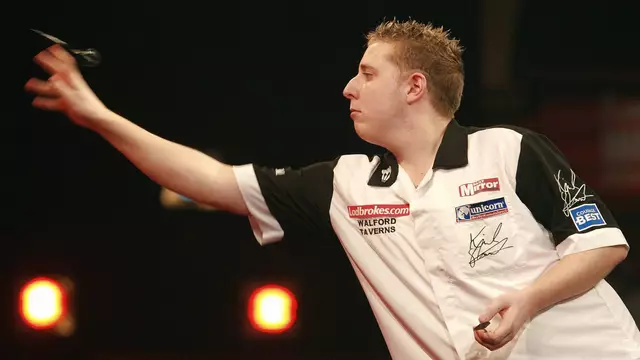
In the electrifying world of professional darts, where precision meets pressure under the glaring lights of Alexandra Palace, tales of overnight glory often come with a hidden undercurrent of peril. Nearly two decades ago, a lanky 21-year-old from the quiet corners of Kent stunned the sporting universe by storming into the PDC World Darts Championship final as a staggering 1000-1 outsider. Kirk Shepherd wasn’t just playing darts; he was rewriting the script of underdog triumph, dispatching legends like Terry Jenkins, Peter Manley, and Wayne Mardle along the way. Matches teetered on the edge—surviving match darts in nail-biting encounters that left fans breathless. But in the end, it was Canadian powerhouse John Part who claimed the crown, leaving Shepherd with a runner-up prize of £50,000 and dreams that seemed boundless.
That payout was more than pocket change for a factory worker like Shepherd. It was a lifeline, a ticket out of the grind. “I quit my job right away,” he later reflected, his voice carrying the echo of youthful exuberance. The money burned a hole in his pocket, fueling a belief that the world of darts was now his oyster. Early accolades had already marked him as a prodigy: victories in the 2004 and 2006 British Opens, the 2003 World Youth Masters, and a string of other titles that whispered of a glittering future. Pundits tipped him as the next big thing, a solid professional on the cusp of dominance. For a brief, intoxicating moment, Shepherd basked in the glow of potential immortality. The final wasn’t a defeat; it felt like a launchpad.
Yet, what followed wasn’t ascent but a slow, unraveling spiral—one that exposed the fragility of fame in a sport as mentally taxing as darts. Flush with cash and adulation, Shepherd confessed to a dangerous complacency settling in. “I thought everything was going to fall on a plate for me and it was the start of a new beginning, a bright new dawn,” he admitted, his words laced with hindsight’s bitter clarity. But the effort waned. Practice sessions grew sporadic; the relentless discipline that had carried him to the final stage eroded under the weight of easy wins and easier distractions. The dartboard, once a faithful companion, began to feel like a distant memory.
By 2012, just four years after his near-triumph, the fairy tale had curdled into nightmare. The £50,000 windfall had vanished—eaten up by poor decisions, unchecked spending, and the harsh realities of a career without sustained momentum. Shepherd found himself alone in a dingy, flea-infested one-bedroom flat, a far cry from the bright lights of Ally Pally. “From earning £50,000 as runner-up at the World Championship in 2008 and having some wealth, four years later I was living on my own in a flea-ridden one-bed flat,” he shared, the raw vulnerability in his tone painting a picture of isolation and regret. The man who had thrilled millions on television was now grappling with the shadows of obscurity, his once-promising trajectory derailed by laziness he now owns as his own undoing.
The descent deepened with the onset of “dartitis,” the dreaded yips of the darts world—a psychological chokehold that turns a fluid release into a frozen nightmare. For Shepherd, it wasn’t just a slump; it was a thief in the night, stealing his confidence dart by dart. Matches became torturous, the simple act of letting go an insurmountable hurdle. In a moment of profound despair, he handed back his PDC tour card at the start of 2022, severing ties with the professional circuit that had defined him. Turning to his partner, he uttered words that still chill: “I’ll never throw another dart again.” The board gathered dust; the dreams shattered. At 38, hailing from the same Kent roots that once fueled his fire, Shepherd’s life had veered into uncharted, unforgiving territory. No more spotlights, no more crowds chanting his name—just the quiet hum of reflection on roads not taken.
Shepherd’s story isn’t merely a cautionary footnote in darts lore; it’s a stark mirror held up to the sport’s current darlings, like the teenage phenom Luke Littler, who at 16 mirrored Shepherd’s improbable run to the 2024 final before claiming the title in 2025 at just 17. Littler’s poise under pressure—dispatching former champions with averages that defy belief—has sparked similar whispers of invincibility. Yet Shepherd’s voice cuts through the hype, a seasoned warning wrapped in hard-won wisdom. “I got lazy. I stopped putting in the effort,” he cautioned, urging young guns to guard their hunger fiercely. In an era where darts superstars rake in fortunes—Littler himself joking about blowing £200,000 on FIFA points amid his whirlwind success—the temptation to coast is ever-present.
Reflecting on his unraveling, Shepherd doesn’t dwell in self-pity. Instead, he speaks of lessons etched in adversity: the importance of resilience, the peril of complacency, and the mental fortitude required to sustain brilliance. Darts, after all, is as much a battle of the mind as of marksmanship. For every Littler hoisting trophies—the Premier League at 17, nine-darters on live TV, a Triple Crown that cements his legend—there’s a Shepherd reminding us that glory is fleeting without grit. His journey from factory floors to final stages, and back to the brink, underscores a timeless truth: in the high-stakes arena of professional sport, the fall can be as swift as the rise. Today, as Shepherd rebuilds in the quiet aftermath, his tale endures as both tragedy and teacher—a poignant reminder that even the sharpest arrows can miss their mark if the archer falters.
Leave a Reply